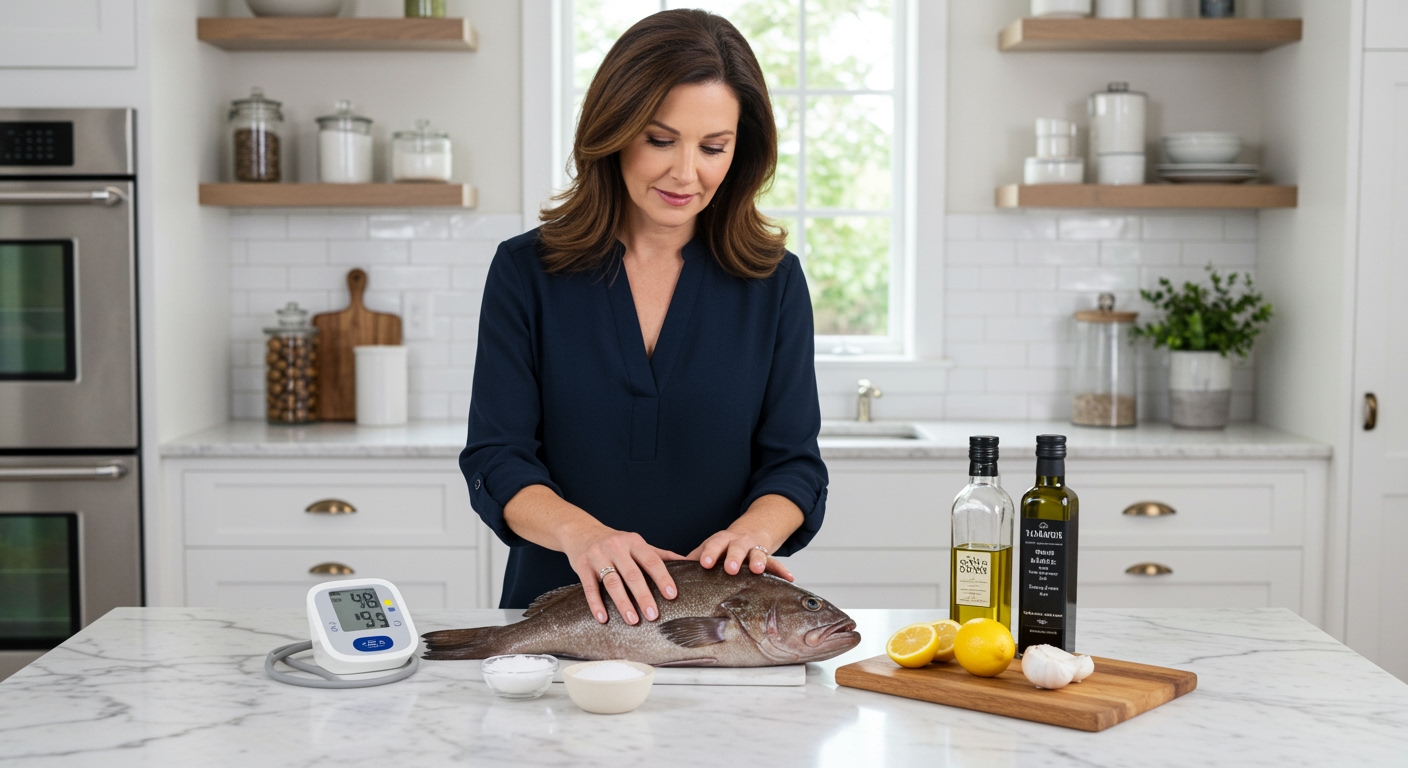✪ Key Takeaway: Grouper can potentially raise blood pressure due to its moderate sodium content and preparation methods.
Introduction
You walk into your favorite seafood restaurant and see grouper on the menu.
Your doctor told you to watch your blood pressure, so you wonder if this popular fish will help or hurt your cardiovascular health.
Hi, I’m Abdur, your nutrition coach and today I’m going to explain exactly how grouper affects your blood pressure and what you need to know before your next seafood dinner.
What Makes Grouper Different From Other Fish?
Grouper belongs to a family of large predatory fish that live in warm ocean waters.
Unlike smaller fish like sardines or anchovies, grouper has a firmer texture and milder taste that appeals to many people.
The fish naturally contains about 60 milligrams of sodium per 100 grams of raw meat.
This sodium level sits in the middle range compared to other seafood options.
Fresh grouper also provides high-quality protein and essential amino acids your body needs for muscle maintenance and repair.
However, the way restaurants and home cooks prepare grouper often changes its impact on blood pressure significantly.
✪ Fact: Wild-caught grouper typically contains less sodium than farm-raised varieties due to different feeding practices.
How Does Sodium In Grouper Affect Blood Pressure?
Your kidneys work hard to maintain the right balance of sodium and water in your bloodstream.
When you eat foods high in sodium, your kidneys hold onto more water to dilute the excess salt.
This extra water increases your blood volume, which puts more pressure on your artery walls.
The natural sodium in fresh grouper rarely causes problems for most people with normal kidney function.
However, many restaurants add salt-based seasonings, marinades, or breading that dramatically increase the sodium content.
A typical restaurant-prepared grouper dish can contain 800 to 1200 milligrams of sodium, which represents about half your daily recommended limit.
People with existing high blood pressure or kidney problems may experience a temporary spike in blood pressure after eating heavily seasoned grouper.
✪ Pro Tip: Ask restaurants to prepare your grouper with herbs and lemon instead of salt-heavy seasonings.
Does Cooking Method Change Grouper’s Blood Pressure Impact?
The way you cook grouper makes a huge difference in how it affects your cardiovascular system.
Grilling, baking, or steaming fresh grouper with minimal added salt keeps the sodium content low.
These cooking methods also preserve the fish’s natural omega-3 fatty acids, which can help reduce inflammation in your blood vessels.
Frying grouper in oil or coating it with breading adds unnecessary calories and often requires salt for flavor enhancement.
Restaurant-style blackened grouper typically uses spice blends that contain significant amounts of salt and sodium-based preservatives.
Home cooks can control the sodium content by using fresh herbs, garlic, citrus juice, and pepper instead of salt-heavy seasonings.
Marinating grouper in acidic ingredients like lemon juice or vinegar can tenderize the meat without adding sodium.
✪ Note: Steaming grouper with vegetables creates a complete low-sodium meal that supports healthy blood pressure.
What About Grouper Compared To Other Seafood Options?
When you compare grouper to other popular fish choices, the sodium differences become clear.
Fresh salmon contains about 50 milligrams of sodium per 100 grams, making it slightly lower than grouper.
Cod and tilapia have even less natural sodium, with around 40 milligrams per serving.
However, processed seafood products like canned fish or frozen fish sticks contain much higher sodium levels.
Shellfish like shrimp and crab naturally contain more sodium than finfish, with 150 to 200 milligrams per serving.
The key difference lies not just in the fish itself, but in how food manufacturers and restaurants prepare it.
Fresh grouper prepared simply at home ranks as a moderate choice for people managing blood pressure.
✪ Fact: Frozen grouper fillets often contain added sodium solutions to preserve freshness during shipping.
Can People With High Blood Pressure Safely Eat Grouper?
Most people with high blood pressure can include fresh grouper in their diet when prepared properly.
The American Heart Association recommends limiting daily sodium intake to 2300 milligrams for most adults.
People with existing hypertension should aim for even less, around 1500 milligrams per day.
A 6-ounce serving of plain grilled grouper contributes only about 100 milligrams of sodium to your daily total.
This leaves plenty of room for other foods throughout the day without exceeding safe sodium limits.
However, people taking blood pressure medications should monitor their response to any new foods.
Some individuals experience sodium sensitivity, meaning even moderate amounts can cause blood pressure spikes.
✪ Pro Tip: Check your blood pressure 2-3 hours after eating restaurant grouper to monitor your individual response.
The Bottom Line
Fresh grouper prepared without excessive salt or sodium-heavy seasonings is unlikely to raise your blood pressure significantly.
Smart food choices happen in your kitchen, not just on your plate, and controlling how you prepare grouper makes all the difference for your cardiovascular health.
I would love to hear about your experiences with grouper and blood pressure in the comments below, or if you have any questions about incorporating seafood into a heart-healthy diet.
References
At NutritionCrown, we use quality and credible sources to ensure our content is accurate and trustworthy. Below are the sources referenced in creating this article:
- PMC: Seafood Consumption and Cardiovascular Health
- PubMed: Sodium Content in Fish and Shellfish
- Mayo Clinic: Omega-3 in Fish: How Eating Fish Helps Your Heart
- American College of Cardiology: Seafood and Cardiovascular Health





